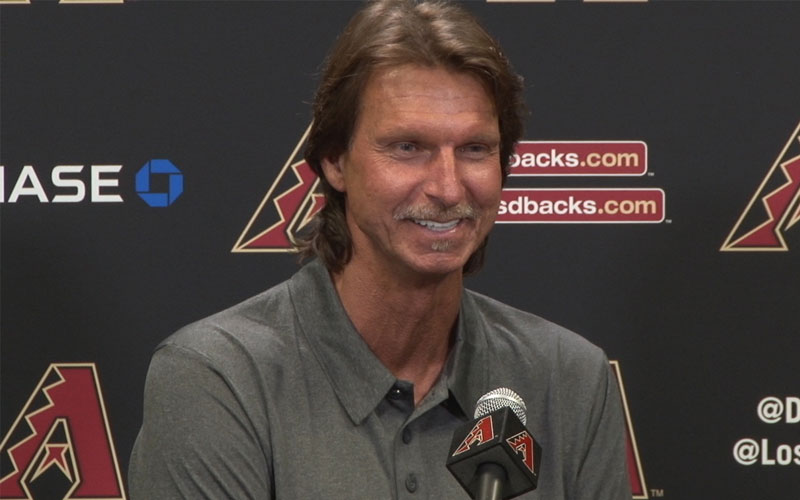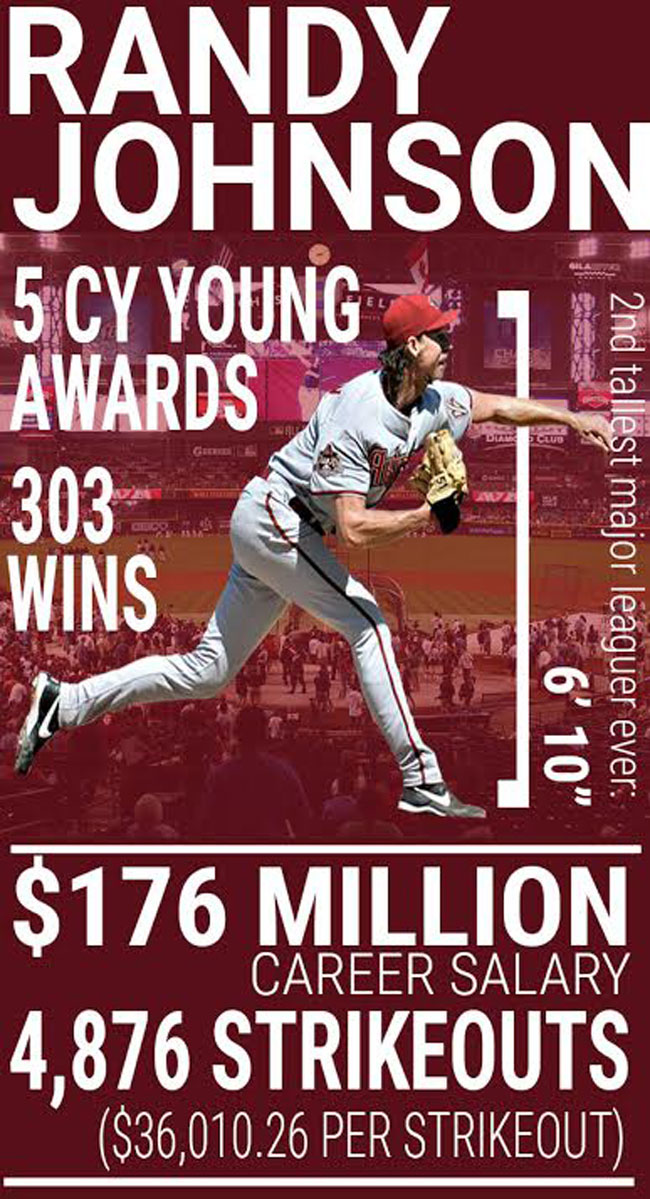
Randy Johnson talks about the Hall of Fame induction with Phoenix media. (Photo by Chris Wimmer/Cronkite News)
Randy Johnson used to cram his 6-foot-10-inch frame into the luggage racks above the seats in the charter buses used by his minor league team so he could sleep on long road trips. He said 12- to 15-hour rides were common when he was coming up through the Montreal Expos’ system in the late 1980s.
Johnson frequently shares stories like this with pitchers throughout the Diamondbacks’ organization in his current role as a special assistant to team president and CEO Derrick Hall. He prefers telling tales of his challenges, rather than accounts of his successes, to emphasize the hard work and focus required to be successful.
“Hey, I struggled,” Johnson said of his first few years as a professional baseball player. “I really did. I struggled mightily.”
Those struggles came at the beginning of a 22-year MLB career that was historic. He was a five-time Cy Young Award-winner, a 10-time All-Star and co-MVP of the 2001 World Series. Johnson won 303 games and finished his career with the second-most strikeouts in MLB history.
His career will culminate in an induction into the National Baseball Hall of Fame on Sunday.
Yet Johnson always goes back to his early days when he speaks to up-and-coming pitchers. He played in the minor leagues for four years before finally breaking out with the Seattle Mariners in 1989 at age 25. He particularly enjoys talking to young players so he can inspire them in the early stages of their careers.
“When you get to the major leagues, you should already be motivated,” Johnson said. “The minor league kids sometimes need to see the light at the end of the tunnel, what they’re playing for and what it’s going to take to get them there.”
Diamondbacks manager Chip Hale saw the value of Johnson relating his experiences to the players during spring training.
“He was pivotal, coming in and speaking to them, just trying to give them his story,” Hale said. “It was a long road for him and to understand that what he had to go through and the changes he made in his career to become the guy that’s a Hall of Famer now was huge for our guys to hear.”
Johnson emphasizes focus and hard work when he speaks to players but his message boils down to one central theme: “Pitch like it’s your last game.”
The message definitely resonated with members of the Diamondbacks current staff. Three-and-a-half months removed from spring training, right-hander Jeremy Hellickson was able to quote it verbatim, before noting the aspect of Johnson’s game that he most admired.
“He was always fired up, always attacking the hitter and going right after him,” Hellickson said.
Robbie Ray, who started the season with the Diamondbacks’ Triple-A club, had even more contact with Johnson when the retired pitcher flew to Reno to monitor Ray’s first bullpen session.
Ray said he spoke with Johnson for almost an hour about the mental side of the game.
“It’s huge, even for guys that are here (on the major league roster),” Ray said. “It never hurts to have a Hall of Famer around to talk to. He’s a huge asset to have here.”
But even as Johnson addresses the team during spring training or tours the minor league clubs giving advice and assistance, he said he’s not sure how the players receive his words or if they retain his message.
There is no doubt, when it comes to Ray and Hellickson. Ray recently stated the biggest takeaway from his discussion with Johnson those months ago in Reno.
“You never know which game is going to be your best game until you finish your career. Go out there and compete every time like it’s your last game.”
